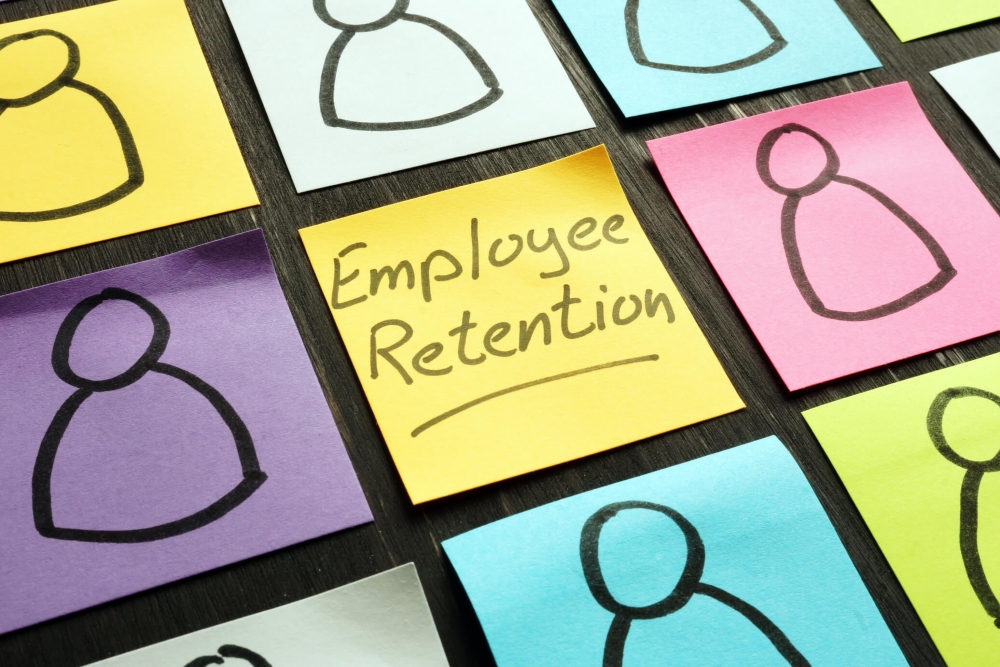
Regardless of the industry, attracting and retaining the right talent is critical to ensuring business performance and success. A study of individual performance from various sectors, including entertainers, athletes, researchers, and politicians, discovered that high performers can be 400% more productive than average ones.
Nonetheless, one of the most serious issues confronting many businesses around the world is the retention of key employees. We now live in a fast-paced world where any job market is as competitive as it has ever been. Job hopping (where an individual holds multiple positions in less than two years), which was once considered a negative trait on resumes, is now fairly common.
This is more pronounced now, as businesses try to recover from the Covid-19 crisis, and are willing to engage in employee poaching (i.e., hiring the current or former employees from a competitor or similar company). This means that your employees have options to explore, other than only working for you. So, if you can't keep your employees engaged, they'll likely leave for other companies that offer better benefits, or even go the self-employed route.
It's no surprise that employee turnover and attrition rates are now higher; a major factor of this has been the anxiety brought on by Covid-19, whether it's the stress of working from home, or the overall turn of the world's economy. There's even a phenomenon known as the 'Great Resignation' or the 'Big Quit', which is prompted by the pandemic as the workforce realises that having a job is not the only way to earn money, nor is it worth the stress of it all.
The U.S Bureau of Labor Statistics recorded 4.25 million people who resigned in January 2022, an increase from the previous January's 3.3 million, with more than 40% of workers actively seeking or planning to seek new employment. A survey of knowledge workers around the world discovered that, on average, more than half of them are looking for a new job within the next year. According to a survey conducted in the United Kingdom and Ireland, 38% intend to quit within the next 6 to 12 months.
Generation-wise, the EY survey found that Baby Boomers or those with more than a 10-year tenure at a company, are more likely to stay, as compared to millennials who are likely to quit by more than twofold! Furthermore, resignation rates are higher among those aged 30 to 45 years old.

Employees who are skilled and talented are valuable assets to any organisation. Businesses can maximise productivity, increase profitability, and even save money in the long run by utilising these skills.
Of course, with competition amongst companies to hire the best intensifying in all major industries, finding the right person is no easy task. However, once talented employees are hired, it's equally important to retain them. So, as employers, what can you do to ensure talent retention?
Employees rarely leave a company for no apparent reason. Most of the time, they must be dissatisfied with something, or have discovered a better opportunity. To retain good fits, it's highly imperative to understand the reasons they may leave.
According to a study conducted by Personio and Opinium, toxic cultures and underappreciation are two of the most common reasons employees consider leaving their jobs. Work-life balance and pay freeze or cuts are also some of the main reasons prompting resignations.
Read more: High Employee Turnover: 10 Toxic Workplace Issues That Cause It, And How To Manage Them
This would then come down to how well you connect with your workforce. Some of the things you can do to identify and track employee turnover are as follows:
It's also important that you determine each employee's appreciation criteria and understand other intrinsic and extrinsic motivations such as career growth, decision-making opportunities, recognition, and feedback to retain talented employees.

Why you hire new employees into the organisation in the first place matters when it comes to retaining employees. To avoid wasting resources and having someone who's not positioned to succeed with the company, hire and retain the right people.
Hiring the wrong people for the job can result in up to 70% more time spent dealing with a poor performer in a team, as well as up to 25% (or more) of the annual salary set for the role for the hiring process to be repeated. Furthermore, the consequences of a bad hire can include a disruption in company culture, reduced work output, and potential customer and revenue loss.
The pandemic has opened discussions about the possibility of working from home, either fully or in a hybrid with on-site work. Offering scheduling or workplace flexibility would increase the likelihood of employee retention. It also increases engagement, and talents are seen to be more enthusiastic with better physical health – which naturally improves overall profitability.
Having been given this flexibility, employees can gain better work-life balance. The Gartner 2021 Digital Worker Experience Survey found that up to 43% of workers report being more productive with flexible working hours. Working remotely also allows employees to work up to 1.4 more days per month (or 16.8 more days per year) than office workers, according to a survey conducted by Airtasker.
Employees who can go to work and be passionate about the work they do are more likely to stay. In a study conducted by Millennial Branding and Beyond.com, 30% of workers cited salary as the most important benefit they considered when choosing an employer, while 30% cited meaningful work. This placed meaningful work and pay on an equal footing.
When employees feel engaged, they find meaning at work and are willing to work hard while they are on the job. This is as per a Harvard Business Review which stated, “people at work are more likely to thrive and grow when they experience their job as meaningful.”
Furthermore, according to the Deloitte Talent 2020 Report, 72% of respondents who planned to stay with their current employers felt that their skill sets were valued. In contrast, 42% of participants who intended to change jobs stated that their employers were not utilising their skills effectively.

Who enjoys being managed and bossed around by inept managers or supervisors? Yes, we thought so, no one does! Bosses play an important role in any workplace, and poor ones can directly cause employee turnover and ruin a company's prospects.
People in positions of authority must be aware of what is going on in the ranks below, and how superiors treat their subordinates. Consider this: LinkedIn shared a study in which men who reported having bosses they didn't respect were 60% more likely to suffer a heart attack or another life-threatening cardiac condition!
So, never dismiss signs of bad governance in your organisation if you want your top talent to stay. According to a GoodHire report, (82%) of American workers said they might quit their job because of a bad manager. This demonstrates how poor management can result in low employee retention.
Exposing employees to relevant and consistent training not only improves their knowledge and skills but also helps enhance the company’s performance and outcomes. When you provide opportunities for employees to advance and become more effective and/or skilled, they’ll appreciate it, and are more likely to remain loyal.
A survey conducted by the Society for Human Resource Management (SHRM) found that nearly 70% of people who go through good onboarding programmes stay with their employers for more than three years. Through training, workers gain a path to continued growth, and the confidence to handle any task given to them.
Simultaneously, many employees are more willing to stay if they believe there’s room for promotion and advancement. Make sure to determine which types of training are appropriate for your employees and make frequent announcements about training possibilities to keep them motivated.
Remember that no employee walks into a job knowing exactly what is expected of them. There must be some things they have yet to learn or be made aware of. That’s why it is critical to consider how you provide feedback/criticism to them for them to improve.
When providing feedback, be specific and positive so that workers are encouraged to do better and give their best effort. Additionally, provide specific examples and actionable suggestions for progressive change, allowing problems to be resolved quickly and easily without hurting anyone's feelings.
When you have negative comments to make in the future, try to restrain yourself and see if you can positively say them, or combine them with more positive comments to create a balance. Most importantly, reach out to your employees to make them feel welcome and free to express themselves.

Employers must promote employee mental health at work if they want to attract and retain committed employees. According to a recent survey conducted by Modern Health and Forrester Consulting, 73% of employees said they would be more likely to stay at a company that provided high-quality mental health resources.
This is evident when a pandemic strikes, and organisations are required to look after the mental health of all employees. If your employees believe that the mental health benefits provided do not meet their needs, there’s a good chance that they will leave for something better.
Focusing on employees who work remotely is especially important because they tend to juggle work, home chores, and family responsibilities. This resulted in working outside of designated work hours, which could lead to job burnout. Always check in on your employees, especially if you know they're going through a difficult time.
According to Lattice's SOPS report, the number one driver of employee turnover is compensation, with more than half (55%) of employees leaving for jobs with higher pay.
This demonstrates that competitive compensation should be a top priority if you want to keep your employees engaged in their jobs. If your employees believe they are not being compensated adequately for their efforts, they will become dissatisfied with their jobs and seek employment elsewhere.
Conduct the necessary research, and work to ensure that your employees are fairly compensated. Concurrently, communicate your compensation strategy so that your workers understand how decisions are made. This will make them feel more connected to the organisation, giving them a reason to stay.

The overall support and welfare systems in place for employees are one of the more talked about aspects of working and work culture. Mentorship programmes, for example, can help new employees with questions, and confusion about tasks and roles.
Another factor to consider when it comes to talent retention is personalised employee support. By assuring that employees are taken care of across the board with the assistance they may require, they’re able to stay at their post for longer. Providing personalised support can increase employee loyalty to the company by up to 40%.
Workers will feel valued and respected that the company prioritises their interests as well as their productivity by catering to this as part of employee welfare. This will naturally build loyalty and consequently reduce the employee turnover rate.
According to PWC's Future of Customer Experience Report, one in three customers will leave a brand they love after just one bad experience, while 92% would completely abandon a company after two or three negative interactions." This emphasises the importance of ensuring that your workplace culture and environment are conducive to employee happiness.
Embracing employee happiness can help retain talent while preventing unwanted turnover. Make them feel valued and respected by learning about their personalities, soliciting feedback, establishing trust, and providing recognition, among other things.
Now that you're aware of all of these strategies, which do you believe would be most effective in assisting your company in retaining its employees? Some businesses are already taking advantage of this to ensure that they do not lose quality and invested employees who are valuable to them.

There are numerous advantages to retaining skilled and invested employees for both businesses and the workforce. Giving employees assurance and a sense of security through motivations, whether extrinsic or intrinsic, is the nutshell factor that helps them stay with a company.
This means a company must keep its employees engaged to achieve maximum success and growth. Understanding employees, their needs and capabilities, and working together to reach goals (personal and for the organisation) are some ways that companies can do to reduce attritions.
Well-supported employees, on the other hand, can develop loyalty, enthusiasm, and energy, which will increase productivity. Losses can also be minimised in the long run. Mishaps and resource loss are significantly reduced when employees work together for the betterment of the company.
Especially in the aftermath of a pandemic, where the very structure of 'working' and 'being employed' has shifted. Employers must conduct in-depth analysis to determine the best ways to retain talented employees.